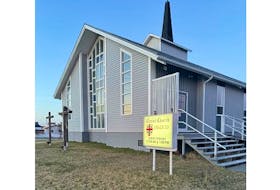ST. JOHN'S, N.L. — As some residents of the region publicly condemn employers who aren't paying their employees for hours not worked during the week-long state of emergency, local business owners say there's good reason for it — they just can't afford to.
"It's heartwrenching," Brent Smith, owner of the Newfoundland Chocolate Company, told The Telegram Thursday. "There's not a single employee who I wouldn't love to tell, 'Yeah, I'll pay it out,' but with such a big loss in sales, we can't afford to do it."
The 90 centimetres of snow that was dumped on eastern Newfoundland on Jan. 17, resulting in a state of emergency being issued in the St. John's metro region since then, came as a huge blow to businesses that were forced to keep their doors closed. Many have lost thousands of dollars in sales, and Smith is no different.
"Those are sales we're not anticipating being able to recoup," said Smith, who has 75 employees at his four stores in the metro region — Duckworth Street, Torbay Road, the Avalon Mall and the St. John's International Airport
He said he was forced to discard much of his product that doesn't have a long shelf life, such as truffles, sandwiches and baked goods. His Torbay Road store also saw some damage to the roof from the storm.
"During all this time, we still had to pay rent. So, it's a significant impact," Smith said. "All total, it's a big chunk of change and it's not a loss that can easily be absorbed."

According to the Newfoundland and Labrador Employers Council (NLEC), while most unionized workplaces have agreements in their contracts with provisions for payment during these types of work interruptions, the legislation that governs non-unionized workplaces, the Labour Standards Act, makes exemptions for things such as fire, acts of God and other incidents that are beyond the control of the employer. As a result, the employer does not have to pay lost wages. However, the decision is left to the individual employer.
Many disgruntled employees have taken to social media to express their displeasure with the decision by those employers who have decided not to pay lost wages – with some calling for a boycott of those businesses.
"Social media can really get nasty quickly," Smith said. "We've got a lot going on with the storm and trying to recover from the storm ourselves. It's not fun being made out to be the bad guy. It's not widespread, but an easy bandwagon for people to jump on.
"There's a tendency to think they're rich and business owners have more money than they're willing to spend. But when you're in it yourself, it's not easy. Every year, you're trying to keep the doors open and … margins are tight. When you lose eight sales days out of a year, that's a lot."
Smith has opted to help his employees in other ways — by giving them the option to use vacation time, giving them opportunities to work additional hours to recoup lost wages and offering cash advances.
"My employees are everything to the business and we want to do everything we can to help them," Smith said, "but we can't put the business under in the process."
Frustrated employers
NLEC executive director Richard Alexander said he's been contacted by a significant number of employers who are frustrated with the situation. He said they understand the challenges with such a major storm and understand that public safety is paramount, but the loss to business across the province has been severe in a month that is already difficult for sales.
He said some businesses in the northeast Avalon are losing $100,000 a day during the state of emergency.
"It's not black or white and it's unfortunate that some people — those on social media, in particular — are painting this as black or white."
"The frustration is real," Alexander said. "They're stressed not only about the short-term impact, but there's a number of them stressed about the long-term impact and viability of their business.
"It's not black or white and it's unfortunate that some people — those on social media, in particular — are painting this as black or white," he said. "If you're paying your workers during a state of emergency, you're good. If you're not doing that, you're bad."
Smith and Alexander said to look at the positive way businesses have stepped up during this difficult time — sending food to workers at the hospital, and offering free transportation, accommodations and food to people who are stranded.
"I think the way to think about this is business is part of the community, employees are part of the community, and we're all very much in the same boat," Alexander said. "It's important to recognize that everybody is under stress with this, and I think, overall, what we've been seeing and hearing is that employers are very much looking to do whatever they can to hep employees through this difficult time."
Twitter: TelyRosie









